War, Waste, and Moneylenders: factoring social and economic instability into ecological catastrophe and the decline of western civilization
An editorial by Ryan King, special to mongabay.com
November 12, 2008
"If war, waste, and moneylenders were abolished, you'd collapse. And while you people are over consuming the rest of the world sinks more and more deeply into chronic disaster… as prosperity goes down political ruthlessness and one-party rule, nationalism and bellicosity begin to rise."
-Aldous Huxley, Island
|
|
When proposing and exploring solutions to environmental crises we rarely, if ever, consider social and geopolitical factors such as massive refugee migrations, economic market instability and collapse, wars for resources, the peaking of oil, civil uprisings/riots, and the rise of fascism/military oppression. If we hope to create lasting and effective solutions to environmental issues of the 21st Century it is clear we must consider facets beyond the realm of traditional environmental science and shift towards multi-disciplinary systems-level approaches. In addition to the long list of existing and impending environmental crises (passing points-of-no-return in tropical deforestation and climate change, widespread coral bleaching, and the accelerating mass extinction of biodiversity) we must recognize and adapt to the effects of current and emerging social issues (resource wars, economic collapse, and the rise of fascism).
It is becoming increasingly evident that these compounding and interlinking threats to global stability may significantly deter the continuance of civilization. While many great minds of the past have clung to the notion of directing our efforts towards salvaging civilization, there is now a substantial movement which identifies civilization – especially industrial civilization – as the culprit in our long list of both social and ecological calamities, and offers solutions for humankind to survive and prosper beyond the traditions, schooling, institutions, governance, infrastructure and chaotic elements inherent to civilization.
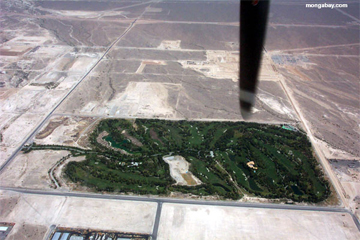
|
Novel and emerging paradigms of social functioning beyond civilization are being both discussed and applied from within the collapsing infrastructure and mentality of existing social systems in order to adjust to what have become brittle, malfunctioning social organizations and governing schemes. These solutions are not necessarily rejections of all modern technology and industry, but radical renovations in the values and ordering of social structures and behavioral paradigms. For social innovations of this nature to function requires certain alterations in perception of our world and significant changes in consciousness. As we recognize both the flaws of our current societies, as well as their evolutionary underpinnings, we gather the insight needed to develop more appropriate systems which will be resistant and resilient to future threats in resource shortages, environmental destruction, and social conflict.
Theodosius Dohbansky famously remarked, "Nothing in biology makes sense except in the light of evolution," and we are now – through the studies of sociocultural evolution, memetics, and conscious evolution – beginning to understand the instinctual patterns which lead humans into unstable relationships with each other and their natural resources. Accepting Dohbansky's statement and extending it to even our most complex behavior as a globally-connected social superorganism extends humanities self-knowledge and potential to make rapid, widespread cultural change. Through this path we are able to glean the tools for radical social innovations which may have the potential to deliver a population of humans through this ominous bottleneck in our history and beyond the defunct behaviors of mass violence, over-consumption, wanton destruction of our environment, and the cycles of repression and dominance characteristic of hierarchical societies. By sorting through the basis of our biological nature and understanding how it manifests into cultures and mass social behavior we can identify and explore alternatives. We are consciously crafting the tools which may deliver us beyond civilization.
Before discussing the details of this process or emerging social innovations, we must understand the reasons why so many of us now seek to escape many aspects of civilized cultures. For this, we need only take a superficial glimpse at just a few of history's most recent travesties and the direction they seem intent on pursuing if we cling to civilization and the "business-as-usual" paradigm. A small subset of these elements worth exploring here because of their immediate effects on conservation efforts and environmental restoration are: global wars for resources, economic collapse, and the rise of insurgent conflicts and totalitarian repression. These aspects of existing civilizations are not inherent to human nature; they are human behaviors – manifestations of biological imperatives coalescing and crafting what appears to be the most efficient and effective paths towards survival and prosperity.
Wars for Waste: supporting consumer culture with casualties across the world
-
"It does not matter if the war is not real. The war is not meant to be won but to be continuous. A hierarchical society is only possible on the basis of poverty and ignorance."
– George Orwell, 1984
The agenda of the United States of America is clear: to maintain affluent, wasteful, consumerist culture by economic and military warfare. This has been a feature of US imperialism for many decades; it is expressed bluntly by former Secretary of State George Kennan in Policy Planning Study 23 written in 1948:
…we have about 50% of the world's wealth but only 6.3% of its population. ..In this situation, we cannot fail to be the object of envy and resentment. Our real task in the coming period is to devise a pattern of relationships which will permit us to maintain this position of disparity without positive detriment to our national security. To do so, we will have to dispense with all sentimentality and day-dreaming; and our attention will have to be concentrated everywhere on our immediate national objectives. We need not deceive ourselves that we can afford today the luxury of altruism and world-benefaction.
 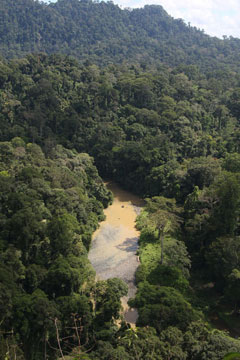 Las Vegas and Borneo |
The profligate lifestyle of much of western culture and United States depends directly on exploitation, forced by both economic manipulation of developing countries and military actions. As the global peaking of oil supplies begins to affect a rapid rise in the costs of the procurement, extraction, and consumer price of petroleum, the United States flexes its military might harder in a violent effort to maintain hegemony over oil-rich locations. The recent conflict between US-backed Georgia and Russia (for control of the Caspian oil pipeline running through Georgia) serves as an example and harbinger of the near future expansion of resource conflicts.
We must make no mistake – the initiative and direction of the United States is clear: to fight until the bloody end across the globe to control the resources needed to maintain the wasteful, decadent and completely unsustainable consumer culture of its population. This approach is inherent to capitalism and extractive-based civilizations.
US policy in support of industrial capitalism is the paragon of civilized culture gone wild in response to steady supplies of resources and luxuries. This culture is unstable and unsuitable for the social and environmental circumstances of the 21st Century. It represents a manifestation of many of our most base biological responses to energy and resource surplus: endless consumption and propagation – this is not sustainable. When it appears resource limits threaten the end of this consumptive drive, the culture responds with similarly base behaviors: lie, cheat, steal, and kill to maintain the "position of disparity" as former Secretary of State Kennan proposed so clearly.
Because the nature of industrial civilization requires the importation of non-local resources and foreign communities do not voluntarily give up their natural resources, economic manipulation is commonly utilized to extract these resources. Exploitation of underage and impoverished workers in underdeveloped countries is a commonplace example. When market schemes fail or are inappropriate, military action is utilized.
This system of military-industrial-corporate abuse is rampant. It is an unfortunate yet inherent facet of the global economy which must be acknowledged and altered as rapidly as possible if we hope to create stable societies that will be receptive and able to adapt to impending environmental crises. One of the first steps towards altering the oil economy as well as confronting climate change is ending the wars for oil. Western consumer culture pounds us with new "green" products for purchase as solutions to climate change and other environmental catastrophes; we are seldom if ever reminded that it is this very culture – and the military efforts which support it – most responsible for these issues. Ending US military action to control oil is crucial. The buying and selling of "green" products only prolongs the collapsing capitalist systems and blinds us from the reality of our situation. As an organization, the United States military is the biggest purchaser and consumer of petroleum and the largest carbon emitter. While we rush to the stores in our automobiles to buy compact florescent bulbs to "save the planet" from climate change we ignore the fact that US military forces are consuming and combusting ecocidal amounts of fossil fuels.
In a past issue of Foreign Policy Magazine, Gordon Adams breaks down the past and projected costs of the "war" in Iraq. The initial US estimated costs in 2003 was $55 billion, the actual costs to date (as of 2007) is over $103 billion. The "conservative" prediction of future costs from 2007 to 2016 is $368 billion. This does not factor in the innumerable costs to human lives, the environment, and global stability in general.
In "The Future of Life," Edward O. Wilson describes the estimated costs for "global conservation," which includes but is not limited to: immediately salvaging the world's biodiversity hot spots, saving the five frontier forests, ceasing all logging of old growth forests, making conservation profitable, initiating mass reforestation projects, and supporting human population planning. Wilson claims, "for global conservation only one-thousandth of the current domestic product or 30 billion out of approximately 30 trillion would accomplish most of the task." The emergency extra military funding alone for the US in the beginning of the war was $54 billion and has risen to $166 billion by 2007. This funding is beyond wasteful – it is the support driving global ecocide.
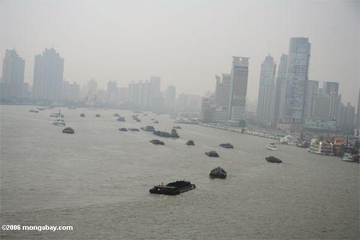 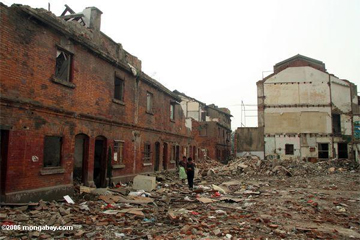 Shanghai |
The military-industrial-technological-consumer culture of the United States and the "westernized" world must be stopped and reversed before it eviscerates the majority of human and non-human life on planet Earth. Many of our brightest minds living within this system now recognize its inherent insanity and instability and are working against it. Former US military intelligence analyst, organization theorist, and geopolitics expert Jeff Vail succinctly explains both the problem and its possible solution (in relation to the peaking of oil):
"A global economy predicated on the notion of perpetual growth is fundamentally incompatible with reliance on a scarce and dwindling resource. Radical decentralization of energy sources, transition to truly renewable energy sources, reliance on vernacular modes and levels of consumption, and moving away from growth-generating hierarchal structures MAY be able to truly solve the problem."
The peaking of oil is already leading to tremendous economic, social, and environmental upsets which may significantly deter conservation efforts. It appears that the oil peak will hit harder and faster due to our past extraction strategies. This instability in our primary energy resource must be considered as we attempt to develop 21st century conservation initiatives. We must ask the question: which makes more sense considering a fragile, collapsing economy and dwindling energy resource – to donate hundreds of millions of dollars to spurious high-tech fixes to climate change such as sending mirrors into outer space or scraping massive amounts of lime into the oceans to absorb CO2 when that money could be spent on grassroots reforestation programs in the tropics, which by raising consciousness in rural tropical areas has the potential to shift culture toward more climate-responsible behaviors?
The cost of oil will increasingly affect travel, transport, and energy consumption necessary for conservation and environmental efforts in the near future. Geopolitical and geological feedback loops exacerbate the effects of peak oil. In our haste to extract oil we chose both the easiest, most available sources first, leaving the geologically difficult to reach sources such as the deep ocean, Canada's tar sands, and the Arctic for last. Similarly, we also sought to extract oil from the most stable areas in terms of geopolitics. Many of the remaining oil producing regions are currently unstable; hence the United State's increasing military actions and rise in internal fascism. While some of our most powerful nations play out a glorified version of rock ‘em sock ‘em robots with the most technologically advanced and deadly weapons in existence in an effort to control energy resources, runaway climate change and environmental collapse threaten the stability of the biosphere and all of its inhabitants.
The United States, despite its hesitancy to admit or act on peak oil and climate change, has been well aware of their implications on security. The struggling superpower is likely to approach climate change refugee events in the same fashion as it deals with extraction and control of energy resources: direct, violent military actions utilizing the most devastating weaponry and experienced armed forces (including the additions of corporate mercenary groups such as Blackwater and Triple Canopy).
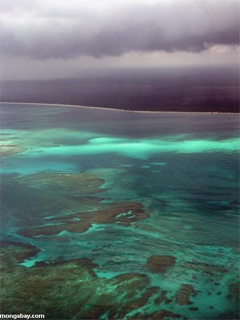
|
For decades we have known that warming oceans could contribute to stronger and more frequent storms and droughts across the planet. Combined with the effects of rising sea levels, these events put more than 630 million residents of coastal areas at risk. Low-lying places such as the Tuvaluan Pacific Island chain and parts of Bangladesh are already being inundated by rising seas, and inhabitants are struggling to find refuge in other areas. British Foreign Secretary Margaret Beckett recently warned the U.N. Security Council climate change threatens massive economic disruption and "migration on an unprecedented scale." Once again, the United State's agenda to cope with climate-linked refugee crises is clear in their policy planning papers, such as the Department of Defense's "An Abrupt Climate Change Scenario and Its Implications for United States National Security" report issued in October 2003. The report surveys a range of feasible worst-case rapid climate change scenarios (some of which are quickly becoming reality) and discusses mitigation primarily in terms of applied military force. After summarizing the many likely resource conflicts and social crises resulting from 21st century climate change, the report concludes with the statement, "Disruption and conflict will be endemic features of life." Unfortunately for the world, global policy tends to react to these types of conflicts after they occur and with violence, instead of directing pre-emptive efforts to avoid the problems.
Military conflicts can never solve ecological crises. The inhumane, insane and violent course chosen by the US must be confronted and altered as soon as possible. Anti-war campaigns and the rising, organizing internal dissidence seen in the 2008 Democratic and Republican National Convention protests indicate a strengthening in the movement, but these efforts are systematically being portrayed by corporate media and government as "terrorist" activities. Environmental and social justice advocates are being targeted as "threats to national security" at a terrifying pace. At the same moment, the United States – in violation of constitutional law (Posse Comitatus) – has begun deploy thousands of soldiers from some of the most "experienced" battalions serving in Iraq for active duty within the country. Aggressive military/police state-style repression of journalists, dissidents, and activists is becoming a growing threat within the US.
The Men who sold the World: Effects of economic collapse and repression on environmental conservation
"Consumption of resources is rising rapidly, biodiversity is plummeting and just about every measure shows humans affecting Earth on a vast scale. Most of us accept the need for a more sustainable way to live, by reducing carbon emissions, developing renewable technology and increasing energy efficiency.
But are these efforts to save the planet doomed? A growing band of experts are looking at figures like these and arguing that personal carbon virtue and collective environmentalism are futile as long as our economic system is built on the assumption of growth. The science tells us that if we are serious about saving Earth, we must reshape our economy."
From "How our Economy is killing the Earth," New Scientist Magazine, 2008
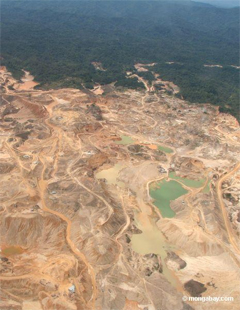 Gold mining in the Amazon rainforest, Peru |
The existing state of industrial civilization and the global capitalist economy it balances on are beginning to collapse and are likely to bring most living beings down with them as they fall if they are not radically altered. Already we have witnessed how quickly a national economic crash can shake global markets – if we hesitate to change the system now the next collapses we face will be widespread and catastrophic, affecting vital resources such as clean water, clean air, and food.
Our civilizations and economies violate many of the most basic laws of life within a materially-limited biosphere as well as those of predator-prey relationships. Since the dawn of agriculture and the formation of hierarchical city-states, we have been building communities which require the extraction and importation of resources from distant locations. We take much more than we give back. We are now left with an insurmountable litany of social and environmental crises, all driven by the most basic principles of civilization and amplified by technologically-enhanced industrial capitalism.
The culture and mainstream policy, however, fail to recognize these violations and are resistant to revision. The effects of the violence inherent to civilization and extractive economies tend to be exported away from those of us living within the culture so that we are not aware, do not care, or are mostly powerless to confront their causes. Fossil fuels are a prime example of this – virtually every aspect of modern life depends on fossil fuels which are commonly acquired by the use of devastating military force. Additionally, the fuels are known to contribute greenhouse gases and many other forms of pollution. Within the culture, however, we are made to feel and think as though the use of fossil fuels is still morally acceptable and non-violent. As long as we are not the ones pulling the triggers or dropping the bombs to secure these fuels from unstable locations we are convinced their extraction and use is justified and acceptable, and that our social systems will provide new, safe resources in a suitable timeframe to ensure a safe and stable climate.
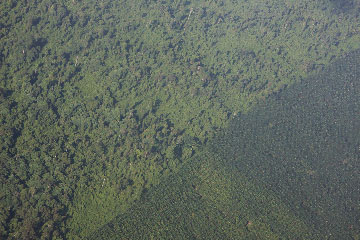 Oil palm plantations in Malaysia, on the island of Borneo |
An important step in the evolution of human consciousness will be to accept these violations (manipulation of impoverished countries, military control of resources, etc) as violent aspects which may not be tolerated. Beyond this we must accept responsibility for the destruction left in the wake of civilization and work outside of the conventions and habits of the system to restore the world to a healthy functioning status.
The system must be radically revised as quickly as possible to achieve stability and regenerate the natural cycles of our biosphere. To do so we necessarily need not resort to outright attack – as in a violent revolution – we can and should utilize the infrastructure and technology of modern civilization to create alternate social paradigms which do not impact our communities and biosphere in the harmful, negative ways of the current culture. Nathan Coe, in his essay, ‘Civilization as Pathology' explains, "Until we (re)create viable alternatives to industrial extractive capitalism and consumer society, we will be incapable of effectively resisting the wholesale destruction of the earth upon which we depend for our very lives. In this context, simply growing a garden is a truly subversive and revolutionary act. A radical re-localization of every aspect of our lives, coupled with a reconnection with a place-based existence, is an absolute necessity if we wish to survive our own creations." Globalizing a revolution in awareness of the consequences and faults of civilization and capitalism, the flaws in their values as well as spreading simple, effective, and safe solutions is of immediate importance.
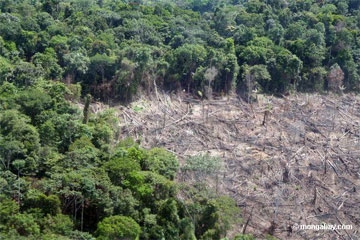
|
In the previous article of this series (Welcome to the Jungle: An Introduction to the end of the Industrial Era) I made the observation that approaching conservation issues piecemeal instead of confronting the systemic faults of civilization will not suffice to address our compounding and escalating social and environmental upsets. So what do rapid, radical and effective systemic solutions look like? These begin with critical analyses of the flaws of existing systems and continue into exploration of new and emerging movements and socio-cultural innovations.
Too often our responses to current issues are dictated from within socio-cultural norms and values; it is rare that we are able to question to validity of the existing society – of the actual system. It is apparent now that the dominant culture, its rule makers, organizations, behaviors and methods are at the root of the problems facing the world in the 21st century. The longer we continue to ignore this culture's malignancy the further we slip into collapse and more difficult we make it for recovery. Our culture has been indoctrinated to complacently accept travesties and injustices against both humans and non-humans which threaten the future of all of life on earth. We are taught to accept our role in the systems, and that the violence we exact on others to support our consumptive habits is justified. So the first step in revising civilization and capitalist/consumer culture is to accept the faults of these systems and rapidly spread this awareness.
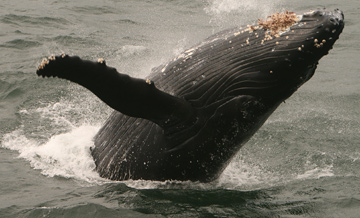 Humpback whale |
Analysis of mainstream views of nature and environmental perspectives by capitalists gives a clear and disturbing image of their motivations, ethic and violent applications. A well-documented example of capitalist-centered values applied to nature is that of economist Colin W. Clark's 1973 analysis of the value of Balaenopterus musculus – the blue whale. In the early 1970's the blue whale had been hunted virtually into extinction, with only several hundred individuals in existence. Clark sought to determine "what practice would yield the whalers and humanity the most money: cease hunting and let the blue whales recover in numbers and then harvest sustainable forever, or kill the rest off as quickly as possible and invest the profits in growth stocks." Disturbingly, Clark reported the most profit would be gained if every last blue whale was exterminated from the planet and the money was invested. From the economic approach there is no value of the blue whale as a part of living systems, as an aesthetic benefit for future generations, as a marvel of creation, or as anything other than a means make a monetary profit. If allowed to continue this culture will eviscerate virtually every living creature and ecosystem on planet earth in order to make money..
More recently the economic collapse is driving attention, financing, and support away from environmental causes. Hank Cox, of the National Association of Manufacturers recently stated regarding climate change action, "Right now, I don't think that will be our primary concern…The next thing is getting consumers out of their lairs to start consuming again…carbon emission schemes are a distant concern. If the economy remains in the same suspended animation that it is now, there will be a reluctance to undertake any expensive new legislative regimes."
Clean Air Watch's Frank O'Donnell expresses a similar sentiment, claiming, "The state of economic turmoil throws up a whole new question mark over climate change legislation. It was already an uphill struggle and the state of the economy has made the angle of that hill even steeper."
Once again, the insane and completely unsustainable urge to drive consumption before all else is inherent. It is abundantly clear that increased consumption and economic growth from within the existing paradigms will harm the environment. This is a recipe for disaster of unprecedented magnitude.
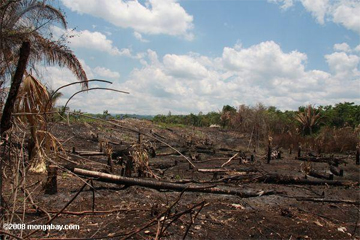 Belize |
Jeff Vail identifies the combined effects of the peaking of oil and the financial crisis as potential detractors from moving toward sustainable societies, explaining, "The next two or three years of focus, budget, and effort fixing the financial crisis are two or three years where we aren't using our rapidly dwindling supply of high net-energy surplus oil and gas to invest in a renewable energy infrastructure or to restructure our economy away from the demand for continual growth."
These compounding and seemingly overwhelming predicaments actually present humanity with the impetus to strive for solutions to the problem of growth and technological innovation. The tools and social systems we forged in our efforts to appease our desires to colonize, consume, conquer, and "develop" the world around us have left us with a grave existential dilemma: change in fundamental and radical ways or perish. Edward O. Wilson poetically frames the problem in his brilliant work, "On Human Nature,"
"The first dilemma, in a word is that we have no particular place to go. The species lacks any goal external to its own biological nature. It could be that in the next hundred years humankind will thread the needles of technology and politics, solve the energy and material crises, avert nuclear war and control reproduction. The world can at least hope for a stable ecosystem and a well-nourished population. But then what? Educated people everywhere like to believe that beyond material needs is fulfillment, and the realization of individual potential. But what is fulfillment, and to what ends may potential be realized?"
 Mining road in Suriname. |
The conundrum posed by Wilson is particular to humankind – it is a philosophical issue reliant on the unique trait of reflective self-consciousness. The self-image which drives humanities goal-oriented behavior drives the collective mentality of mass cultural and civilization. The biological urges which drive our individual self-interests have manifested into civilization and industrial economies, which now, upon reflection and consideration of the consequences of these cultures, appear defunct and disastrous.
Jean-Paul Sartre was credited with founding the cornerstone of the human existential dilemma in his statement that, in man alone, "existence precedes and commands essence." Sartre and many others separated humankind from all other organisms based on this assertion – that our kind has no obvious, inherent purpose. Our ability to reflect on our place in life and evolution grants us the freedom to challenge the essence of our purpose and alter this with changing conditions. Viewed from the angle of socio-cultural evolution, this flexibility in collective sense of purpose may be the most adaptive trait among all social organisms. If, for instance, the regular social behaviors of a colony of army ants lead to rapid changes in environmental conditions which suddenly threatened the entire colony and all of life around them, the ants cannot become quickly aware of the situation nor share the causes and solutions throughout the colony. Let's imagine that the foraging behavior common to army ants caused the spread of a dangerous infectious agent, and it suddenly made much more sense for the army ants to adopt more sedentary, pastoral lifestyles similar to those of leaf cutter ants – the army ants would never be able to recognize the now maladaptive nature of their lifestyles, question its validity, and seek alternative options as a social superorganism. Because they lack reflective self-consciousness, there could never be an ant version of Sartre to propose to the colony that the foundations of the army ant lifestyle had no inherent purpose beyond serving basic biological imperatives. No army ant colony, therefore, is capable of questioning or judging their social order and driving rapid, radical shifts in behavior.
Humans alone have both the burden and gift of reflection on life, on their purpose and role in the process of evolution. It is from the self-image derived from this process of reflection which defines our sense of purpose, and from this purpose springs all ethics, values and morality: the backbones of the social behaviors which glue together civilizations. The social behavior of the mass of human cultures is still driven towards goals of economic development and material progress – still pursuing a hollow purpose which feeds insatiable consumption of resources and drives violent competition.
 Uganda |
Perhaps humanities more immediate purpose this century – before we wipe out the majority of human and non-human life in violent intergroup tournaments, before we strive to colonize outer space, before we take our experiments in genetic modification, nanotech, and other potentially catastrophic technologies too far – is to take pause from development in the "business-as-usual" sense and explore the limits of experience and human potential as a social superorganism by testing the tools of communication and connection within our global population.
A promising antithesis and antidote to human avarice may emerge as a new driver for human purpose in the 21st century, providing a panacea for the shortcomings of our biological imperatives which have compounded into malfunctioning civilizations. From this new sense of purpose and place in our biosphere a countercultural revolution may take root, allowing a significant portion of humans to prosper beyond civilization through the 21st century bottleneck of resource shortages, ecological collapse and military conflicts.
In the third and final article of this series, I will introduce emerging systems-level solutions which have the potential to rapidly and radically alter the course of culture and civilization, as well as survey how these changes may be introduced and applied. I will introduce the ideas of just a handful of emerging cultural visionaries seeking to explore the limits of experimentation on life in the 21st century in efforts to deliver peace and stability to a planet driven to the brink of global collapse by generations of war, waste, and money lending.